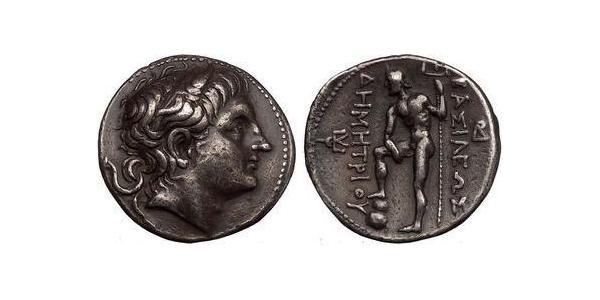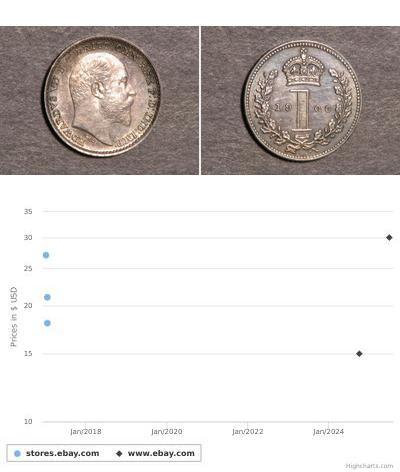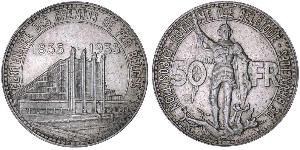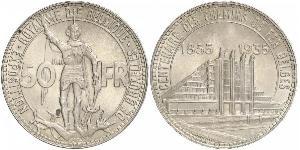[ 5514] Macedonian Kingdom - King Demetrios Poliorketes - 306-283 B.C. Silver Tetradrachm (30mm, 16.8 grams) Amphipolis, 290-289 B.C. Reference: Newell 124 (obv. die CXXII). Diademed and horned head right. ΔΜΗΤΡΙΟΥ, Poseidon Pelagaios standing left, foot on rock, holding trident; monograms to outer left and right. - Son of Antigonos the One-eyed, Demetrios Poliorketes (the 'Besieger') was a romantic character who pursued a most colorful career spanning more than three decades. In his earlier years he assisted his father, whose power was centered in Asia Minor, and in 306 he achieved a great naval victory over Ptolemy of Egypt, in the battle of Salamis, off the coast of Cyprus. After many vicissitudes he seized the Macedonian throne in 294, although he reigned for only six years the dynasty which he founded lasted until the end of the Macedonian Kingdom. He died as a captive in Syria in 283 B.C. Provided with certificate of authenticity. CERTIFIED AUTHENTIC by Sergey Nechayev, PhD - Numismatic Expert Demetrius I (Greek: Δημήτριος Α`, 337-283 BC), called Poliorcetes (Greek: Πολιορκητής - "The Besieger"), son of Antigonus I Monophthalmus and Stratonice, was a king of Macedon (294–288 BC). He belonged to the Antigonid dynasty. Biography At the age of twenty-two he was left by his father to defend Syria against Ptolemy the son of Lagus; he was totally defeated in Battle of Gaza, but soon partially repaired his loss by a victory in the neighbourhood of Myus. In the spring of 310, he was soundly defeated when he tried to expel Seleucus I Nicator from Babylon; his father was defeated in the autumn. As a result of this Babylonian War, Antigonus lost almost two thirds of his empire: all eastern satrapies became Seleucus'. After several campaigns against Ptolemy on the coasts of Cilicia and Cyprus, Demetrius sailed with a fleet of 250 ships to Athens. He freed the city from the power of Cassander and Ptolemy, expelled the garrison which had been stationed there under Demetrius of Phalerum, and besieged and took Munychia (307 BC). After these victories he was worshipped by the Athenians as a tutelary deity under the title of Soter (σωτήρ) ("Preserver"). In the campaign of 306 BC against Ptolemy he defeated Menelaus, Ptolemy's brother, in the naval Battle of Salamis, completely destroying the naval power of Egypt. In 305 BC, now bearing the title of king bestowed upon him by his father, he endeavoured to punish the Rhodians for having deserted his cause; his ingenuity in devising new siege engines in his unsuccessful attempt to reduce the capital gained him the title of Poliorcetes. Among his creations were a battering ram 180 feet (55 m) long, requiring 1000 men to operate it; and a wheeled siege tower named "Helepolis" (or "Taker of Cities") which stood 125 feet (38 m) tall and 60 feet (18 m) wide, weighing 360,000 pounds. In 302 BC he returned a second time to Greece as liberator, and reinstated the Corinthian League. But his licentiousness and extravagance made the Athenians long for the government of Cassander. Among his outrages was his courtship of a young boy named Democles the Handsome. The youth kept on refusing his attention but one day found himself cornered at the baths. Having no way out and being unable to physically resist his suitor, he took the lid off the hot water cauldron and jumped in. His death is seen as a mark of honor for himself and his country. In another instance, he waived a fine of 50 talents imposed on a citizen in exchange for the favors of Cleaenetus, that man's son. He also sought the attention of Lamia, a Greek courtesan. She demanded a price of 250 talents. He put a tax on soap to raise the money. He also roused the jealousy of Alexander's Diadochi; Seleucus, Cassander and Lysimachus united to destroy him and his father. The hostile armies met at the Ipsus in Phrygia (301 BC). Antigonus was killed, and Demetrius, after sustaining severe losses ...
más ...
Similar Coin Groups
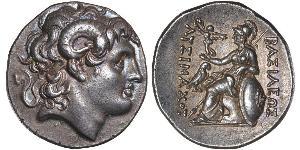
1 Tetradracma Antigua Grecia (1100BC-330 ...
grupo tiene 14 monedas / 14 precios
Add coin to this group
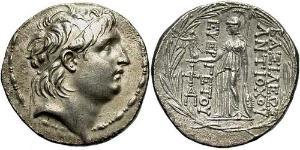
1 Tetradracma Imperio seléucida (312BC-6 ...
grupo tiene 36 monedas / 35 precios
Add coin to this group

1 Tetradracma Antigua Grecia (1100BC-330 ...
grupo tiene 31 monedas / 31 precios
Add coin to this group

2 Guinea Reino de Gran Bretaña (1707-180 ...
grupo tiene 5 monedas / 4 precios
Add coin to this group
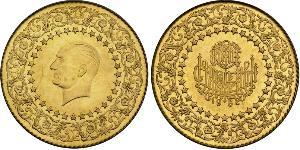
250 Piastre Turquía (1923 - ) Oro Mustaf ...
grupo tiene 7 monedas / 6 precios
Add coin to this group
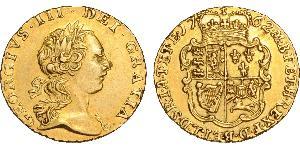
1/4 Guinea Reino de Gran Bretaña (1707-1 ...
grupo tiene 12 monedas / 9 precios
Add coin to this group
2025-06-14
- Historical Coin Prices
2025-05-24
- New coin is added to 50 Franc Bélgica Plata
50 Franc Bélgica Plata
grupo tiene 34 monedas / 33 precios
⇑
Belgien, Königreich, Leopold III. 50 Francs 1935. Eisenbahn. Medaillenprägung. K.M. 106.1 var. Vorzüglich - Stempelglanz
Usted podría estar interesado en …

